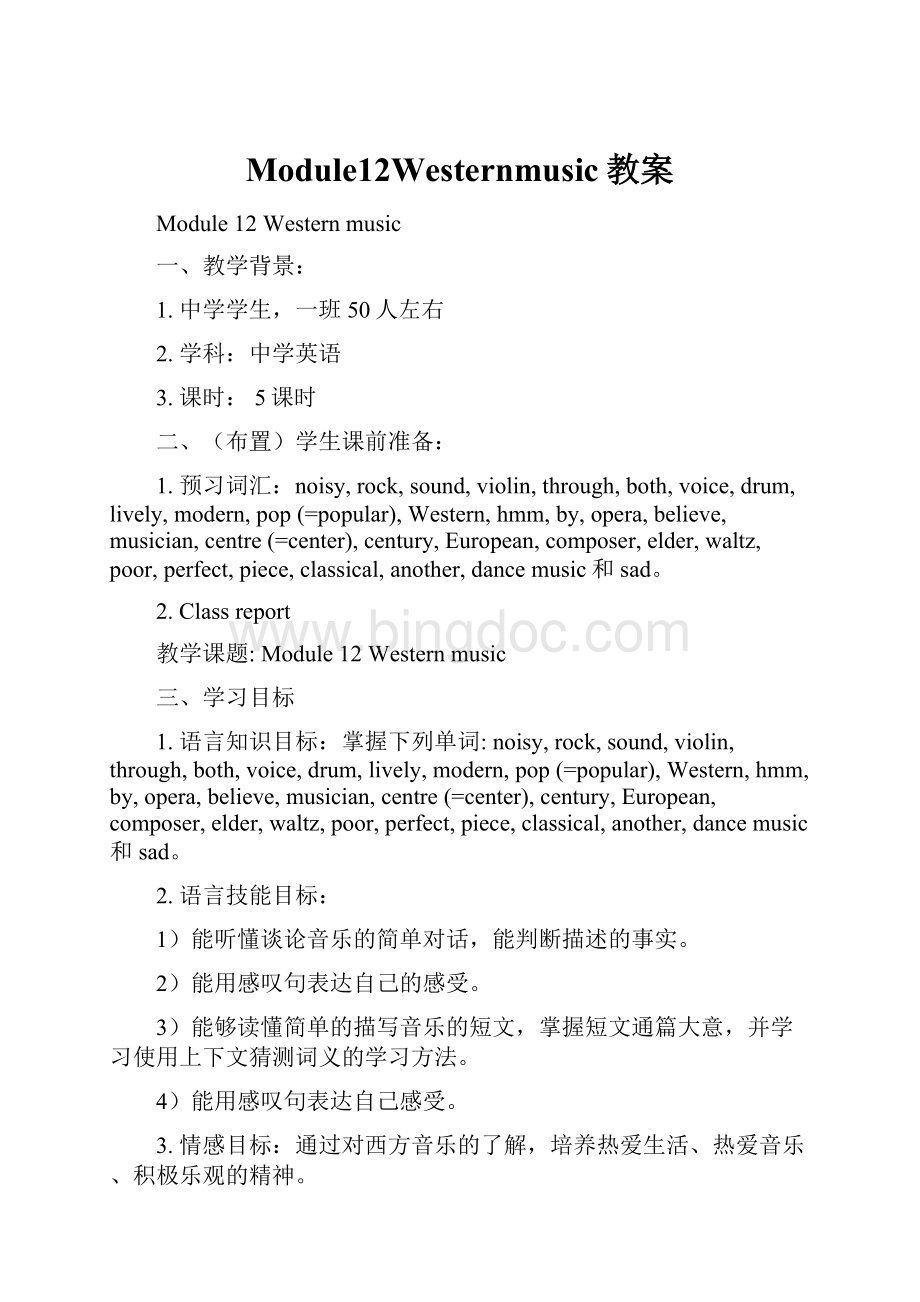Module12Westernmusic教案.docx
《Module12Westernmusic教案.docx》由会员分享,可在线阅读,更多相关《Module12Westernmusic教案.docx(16页珍藏版)》请在冰点文库上搜索。

Module12Westernmusic教案
Module12Westernmusic
一、教学背景:
1.中学学生,一班50人左右
2.学科:
中学英语
3.课时:
5课时
二、(布置)学生课前准备:
1.预习词汇:
noisy,rock,sound,violin,through,both,voice,drum,lively,modern,pop(=popular),Western,hmm,by,opera,believe,musician,centre(=center),century,European,composer,elder,waltz,poor,perfect,piece,classical,another,dancemusic和sad。
2.Classreport
教学课题:
Module12Westernmusic
三、学习目标
1.语言知识目标:
掌握下列单词:
noisy,rock,sound,violin,through,both,voice,drum,lively,modern,pop(=popular),Western,hmm,by,opera,believe,musician,centre(=center),century,European,composer,elder,waltz,poor,perfect,piece,classical,another,dancemusic和sad。
2.语言技能目标:
1)能听懂谈论音乐的简单对话,能判断描述的事实。
2)能用感叹句表达自己的感受。
3)能够读懂简单的描写音乐的短文,掌握短文通篇大意,并学习使用上下文猜测词义的学习方法。
4)能用感叹句表达自己感受。
3.情感目标:
通过对西方音乐的了解,培养热爱生活、热爱音乐、积极乐观的精神。
四、教材分析
外研版7年级英语下册Module12Westernmusicunits1~3,本模块以西方音乐为题材,要求学生通过对西方音乐的了解,学习和掌握感叹句。
本模块的主要语法是what句式的感叹句,教学重点是通过对西方音乐的描述,重点学习本模块中出现的重点词汇、短语、固定搭配和句型。
课前准备一些西方音乐的图片和资料,让学生在warming-up时讨论和观看。
围绕西方音乐这一话题展开听说读写的全面训练,使学生熟悉what句式的感叹句并会使用。
五、教学方法
以说为主要教学方式,以讨论为主要方法,通过同桌讨论和小组以及全班讨论,让每个学生充分练习口语和说的能力,并将听说读写有机地贯穿一体。
设立一些语言环境,结合自己或他人的旅游经历以及旅游景点,最后一起学习重难点,为突破重难点做一些课堂和课后的练习。
六、教学过程
Unit1It’ssobeautiful!
Step1Warmingup
TogivesomepicturesaboutWesternsingertostudents.SuchasMichaelJacksonandtheMusikvereininVienna.Letthemwatchandtalkaboutthem.
Step2Workinpairs.Listenandnumberthewordsasyouhearthem.
()lively()modern()music
()noisy()pop()rock
()sound()violin()Western
Keys:
lively–7modern–5music–1noisy-9pop–8rock–6sound–3violin–4Western-2
Step3Workinpairs.
AnswerthequestionsabouttheconversationinActivity1.Andthenlistenagainandcheck.
1.WhichmodernmusicdoesTonylike?
2.WhatdoesTony’smumthinkaboutrockmusic?
3.Whydoesn’tTonyliketraditionalWesternmusic?
4.WhichmusicdoesTony’sdadthinkistoonoisy?
Keys:
1.Helikespopandrockmusic.
2.It’slively.
3.It’stooslow.
4.Hethinkspopmusicistoonoisy.
Step4ListenandreadtheActivity3.
Check(√)thetruesentences.
()1.They’relisteningtoWesternmusic.
()2.TonyknowslittleaboutStrauss.
()3.StrausswasborninthecapitalofAustralia.
()4.TheBlueDanubeispopmusic.
()5.LinglingenjoysBeijingoperaverymuch.
Keys:
1.√2.√3.×4.×5.√
Step5EverydayEnglish.
¤Whatabeautifulcity!
¤I’mafanofrockmusic.
¤Giveusabreak!
¤Idon’tbelieveit!
Step6Checkthetypesofmusic
Thestudentslike(√)anddon’tlike(x).
name
music
Tony
Lingling
Betty
Daming
traditionalWesternmusic
√
√
Beijingopera
√
pop
√
√
rock
√
Step7Completethesentenceswiththecorrectformofthewordsfromthebox.
believebothdrumGermannoisyvoice
1.Strausswasn’t______.HecamefromAustria.
2.Damingthinksthe______inrockmusicaretoo______.
3.Tonycan’t______thatDamingdoesn’tlikerockmusic.
4.Bettylikes______traditionalWesternmusicandpopmusic.
5.Tonythinksthesoundofthe______inBeijingoperaisverydifferent.
Keys:
1.German2.drums;noisy3.believe4.both5.voice
Step8Completethesentencesaboutyourself.
1.Myfavouritemusicis…
2.Ilikeitbecause...
3.Myparentslike...
Step9Listenandread.
1.Whatabeautifulcity!
2.It’ssobeautiful!
3.Ilovehismusic!
4.Listentothis!
Step10Workinpairs.
Askandanswerthequestionsaboutthemusicyoulikeordon’tlike.
—Whatmusicdoyoulike?
—Ilikepop.It’slivelyandgoodtodanceto,butIdon’tlikerock.It’stoonoisy.Whataboutyou?
Step11Languagepoints
1.livelyadj.活泼的;轻快的
e.g.Sheisalivelygirl.
2.modernadj.现代的
e.g.Doyoulikemodernmusicorclassicalmusic?
3.pop(=popular)adj.流行的;受欢迎的
4.noisy是形容词,意思是“吵闹的”,反义词是quiet“安静的”。
e.g.Popmusicismyfavoritemusic.
5.sound和voice
sound和voice都是名词,“声音”。
sound可以指人或动物发出的声音,或物体碰撞声。
大自然的任何“声音”都可以用sound。
voice指人的声音,说话、谈笑或唱歌。
e.g.Atnightsheheardastrangesound.夜里她听到一种奇怪的声音。
Thegirlhasasweetvoice.
那女孩嗓音很美。
6.by的两种用法
by的是介词,“乘(车/船/飞机)”,本课的by也是介词,“由......创作;被;由”,两者词性相同但意义不同。
例如:
e.g.Youcangettherebybus.你可以乘公交车到那儿。
ThepieceiswrittenbyMozart.这是莫扎特的作品。
7.throughprep.穿过
e.g.Ihavetogothroughthatdooreveryday.
8.both&all
both和all通常放在系动词之后,行为动词之前,两者都可与of连用。
both“两者都”,其中both...and... “……和……两者都”。
e.g.Myparentsarebothteachers.
Bothofherdaughtersaredoctors.
PeterandJackbothliketennis.
BothPeterandJackliketennis.
all“三者或三者以上都”。
e.g.ThethreeboysareallfromAmerica.
ThestudentsinmyclassalllikePE.
All(of)thestudentsinmyclasslikePE.
9.Giveusabreak!
“让我们清静会吧!
”
英语口语中的一种习惯表达方式,用来阻止别人做令人厌烦的事情。
Step12Homework
ReviewandrecitetheimportantpointsofUnit1.
Unit2ViennaisthecentreofEuropeanclassicalmusic.
Step1Warmingup
TogivesomepicturesandvideosaboutStraussWaltztostudents.LetthemwatchandthentalkaboutWesternmusic.
Step2Newwords
Step3Discussion
Lookatsomepicturesandanswerthequestions.
Doyoulikepopmusic?
Doyouknowthetwosingers?
Whatisshedoing?
Sheisplayingtheviolin.Doyouknowanythingabouttheviolin?
Canyouplaythepiano?
DoyouknowanythingaboutLiYundi?
Whataretheydoing?
Theyaredancing.Iknowsomenicedancemusic,sharewithyou.
Doyouknowanythingaboutthem?
Step4Workinpairs.
LookatthepicturesofActivity1anddescribeit.Usethewordsfromtheboxtohelpmystudents.
concertmusicianpianoviolin
Step5Reading
ReadthepassageofActivity2andcheck(√)thetruesentences.
1.ManymusicianscametostudyandworkinVienna.
2.Strausstheyoungerplayedthepiano,theviolinandthedrumsattheageofsix.
3.Mozart’sfamilytookhimaroundEurope.
4.Thefather,JohannStrauss,diedin1791.
5.MozartwroteTheBlueDanube.
Keys:
1.√2.×3.√4.×5.×
Step6Answerthefollowingquestions.
1.WhereisVienna?
2.WhatmusicdidJohannStrausstheelderwrite?
3.HowmanywaltzesdidJohannStrausstheyoungerwrite?
4.WhenwasMozartborn?
5.HowoldwasMozartwhenhedied?
Keys:
1.ItisinthecentreofEurope.
2.Hewrotemusicfortraditionaldances,calledthewaltz.
3.Hewroteover150waltzes.
4.Hewasbornin1756.
5.Hewas35.
Step7CompletethepassageofActivity4withthecorrectformofthewordsfromthebox.
anotherelderEuropeanperfectpoorpopular
BothStraussthe
(1)______andStrausstheyoungerwrotesomevery
(2)_______music.(3)_______successfulcomposerfromViennawasMozart,buthebecamevery(4)______anddiedattheageofthirty-five.ManypeoplethinkMozart’smusicis(5)_______.Allthreeweregreat(6)_________musicians.
Keys:
1.elder2.popular3.Another4.poor5.perfect6.European
Step8Writing
UsethenotetowriteapassageabouttheChinesecomposerXianXinghai.
¤XianXinghai
¤famousforthesongTheYellowRiver
¤wroteitin1939inonlysixdays
¤oneofthegreatcomposersofclassical
andtraditionalmusic
¤borninMacao,China,1905
¤diedyoung,1945
¤calledthe“People’sMusician”
¤usedtraditionalChinesemusic
¤studiedinParis
¤songsarestillpopulartoday
Theycanwritelikethis,
XianXinghaiisoneofthegreatcomposersofclassicalandtraditionalmusic.Hewasbornin...
Step9Languagepoints
1.ViennaisabeautifuloldcityontheRiverDanubeinthecentreofEurope.
维也纳是欧洲中心多瑙河畔一座美丽而古老的城市。
ontheriver…坐落于......河畔
e.g.HishometownisasmallcityontheChangjiangRiver.
他的家乡是位于长江河畔的一个小城。
2.Mozartwasanotherveryimportantcomposer.
anotherpron.又一个,再一个
another后可接单数名词,of加复数名词或数字加复数名词。
e.g.Igotanotherofthosecallsyesterday.昨天我又接了一个那样的电话。
Ihavegotanotherthreequestionstodo.我还有三个问题要解答。
3.Beforehewassix,heplayednotonlythepianobutalsotheviolin.
还不到六岁,他既会弹钢琴,又会拉小提琴。
notonly...butalso...不仅......,而且......
e.g.Shakespearewasnotonlyawriterbutalsoanactor.
莎士比亚不仅是作家,而且是演员。
4.Hewrotehundredsofwonderfulpiecesofmusic.
piecen.(写作、音乐或艺术的)作品,也可指块、片、段(等)。
e.g.TheyperformedpiecesbyBachandMozart.
他们演奏了巴赫和莫扎特的几支曲子。
Shewrotesomethingonasmallpieceofpaper.
她在一小片纸上写了点什么。
6.LikeJohannStrauss,fatherandson,hewasagreatEuropeanmusician...
像施特劳斯父子一样,他是一位伟大的欧洲音乐家......
句中的like的意思不是“喜欢”,而是介词,意思是“像......一样”。
e.g.Hemovesandtalksjustlikehisfather.
他的动作和说话方式就像他的父亲一样。
I’dlovetobeabletosinglikeSarahBrightman.
我非常希望能像莎拉•布莱曼一样唱歌。
6.…,andmanypeoplestillthinkhismusicisperfect.
perfectadj.完美的
e.g.WellI’msorry—butnobodyisperfect.
对不起。
不过人无完人。
Step10Homework
1.ReviewandrecitetheimportantpointsofUnit2.
2.TrytowriteapassageaboutaChinesemusician.
Unit3Languageinuse.
Step1Revision
Doyouknowanythingaboutthem?
JohannStrausstheelder,wroteandplayedmusicfortraditionaldances,calledthewaltz.
MozartwasborninAustriain1765.Beforehewassix,heplayednotonlythepianobutalsotheviolin.
Step2Languagepractice
Whatabeautifulcity!
DoyouliketraditionalWesternmusicorpopmusic?
Step3Grammar
I.Exclamatorysentence感叹句
用来表达喜悦、赞叹、惊异、愤怒、厌恶等较为强烈感情的句子叫作感叹句。
感叹句一般用what或how引导,句末用感叹号。
what修饰名词,how修饰形容词或副词。
感叹句的常用结构如下:
一、what引导的感叹句有三种形式:
◆What+a/an+形容词+可数名词单数
(+主语+谓语)!
如:
Whatalovelyboy(Tomis)!
◆What+形容词+可数名词复数(+主语+谓语)!
如:
Whatbeautifulpictures(theyare)!
◆What+形容词+不可数名词(+主语+谓语)!
如:
Whatdeliciousmeat(itis)!
二、how引导的感叹句通常只有一种形式:
How+形容词/副词(+主语+谓语)!
如:
Howhappythechildrenwere!
Howcarefullyheisreading!
提示:
一般情况下,以what和how开头的感叹句可以相互转换,转换后意义不变。
如:
Whatatallbu